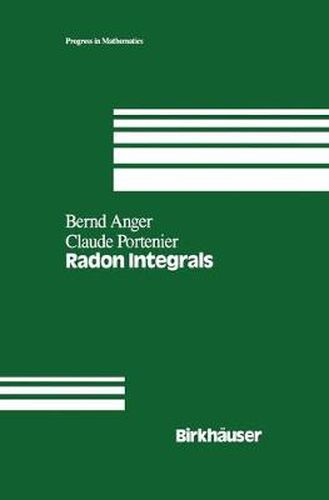Readings Newsletter
Become a Readings Member to make your shopping experience even easier.
Sign in or sign up for free!
You’re not far away from qualifying for FREE standard shipping within Australia
You’ve qualified for FREE standard shipping within Australia
The cart is loading…






This title is printed to order. This book may have been self-published. If so, we cannot guarantee the quality of the content. In the main most books will have gone through the editing process however some may not. We therefore suggest that you be aware of this before ordering this book. If in doubt check either the author or publisher’s details as we are unable to accept any returns unless they are faulty. Please contact us if you have any questions.
In topological measure theory, Radon measures are the most important objects. In the context of locally compact spaces, there are two equivalent canonical definitions. As a set function, a Radon measure is an inner compact regular Borel measure, finite on compact sets. As a functional, it is simply a positive linear form, defined on the vector lattice of continuous real-valued functions with compact support. During the last few decades, in particular because of the developments of modem probability theory and mathematical physics, attention has been focussed on measures on general topological spaces which are no longer locally compact, e.g. spaces of continuous functions or Schwartz distributions. For a Radon measure on an arbitrary Hausdorff space, essentially three equivalent definitions have been proposed: As a set function, it was defined by L. Schwartz as an inner compact regular Borel measure which is locally bounded. G. Choquet considered it as a strongly additive right continuous content on the lattice of compact subsets. Following P.A. Meyer, N. Bourbaki defined a Radon measure as a locally uniformly bounded family of compatible positive linear forms, each defined on the vector lattice of continuous functions on some compact subset.
$9.00 standard shipping within Australia
FREE standard shipping within Australia for orders over $100.00
Express & International shipping calculated at checkout
This title is printed to order. This book may have been self-published. If so, we cannot guarantee the quality of the content. In the main most books will have gone through the editing process however some may not. We therefore suggest that you be aware of this before ordering this book. If in doubt check either the author or publisher’s details as we are unable to accept any returns unless they are faulty. Please contact us if you have any questions.
In topological measure theory, Radon measures are the most important objects. In the context of locally compact spaces, there are two equivalent canonical definitions. As a set function, a Radon measure is an inner compact regular Borel measure, finite on compact sets. As a functional, it is simply a positive linear form, defined on the vector lattice of continuous real-valued functions with compact support. During the last few decades, in particular because of the developments of modem probability theory and mathematical physics, attention has been focussed on measures on general topological spaces which are no longer locally compact, e.g. spaces of continuous functions or Schwartz distributions. For a Radon measure on an arbitrary Hausdorff space, essentially three equivalent definitions have been proposed: As a set function, it was defined by L. Schwartz as an inner compact regular Borel measure which is locally bounded. G. Choquet considered it as a strongly additive right continuous content on the lattice of compact subsets. Following P.A. Meyer, N. Bourbaki defined a Radon measure as a locally uniformly bounded family of compatible positive linear forms, each defined on the vector lattice of continuous functions on some compact subset.